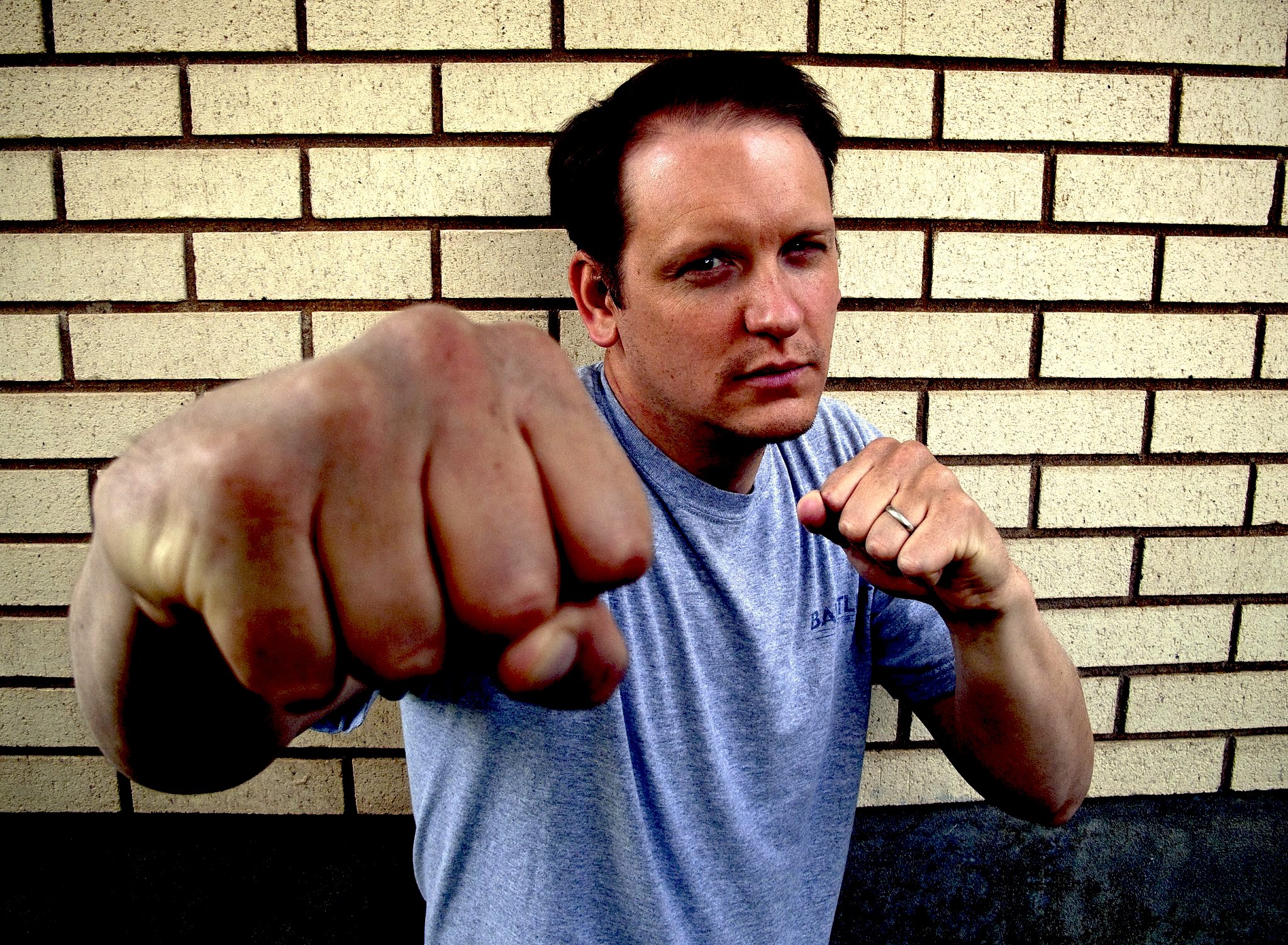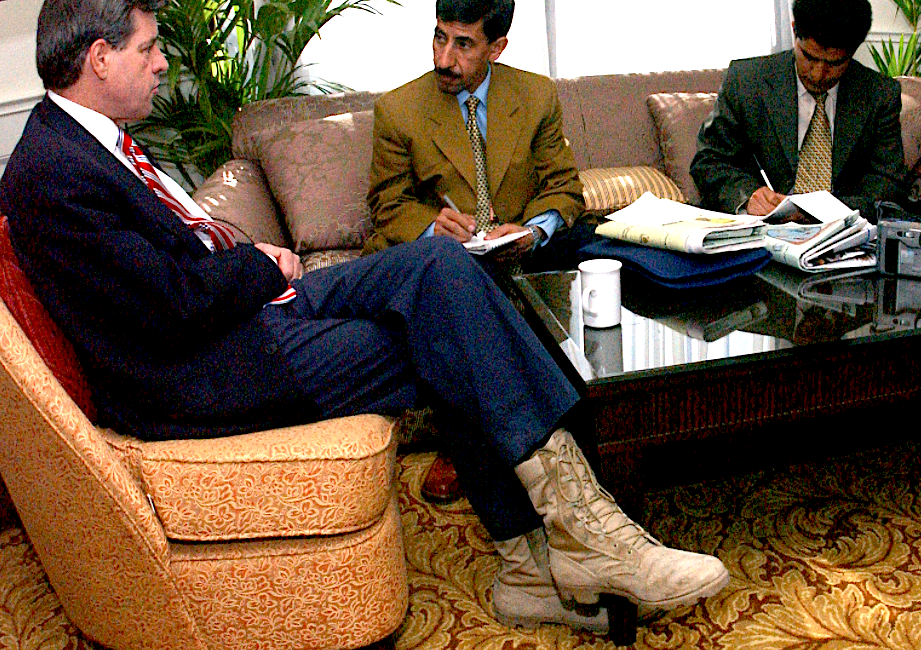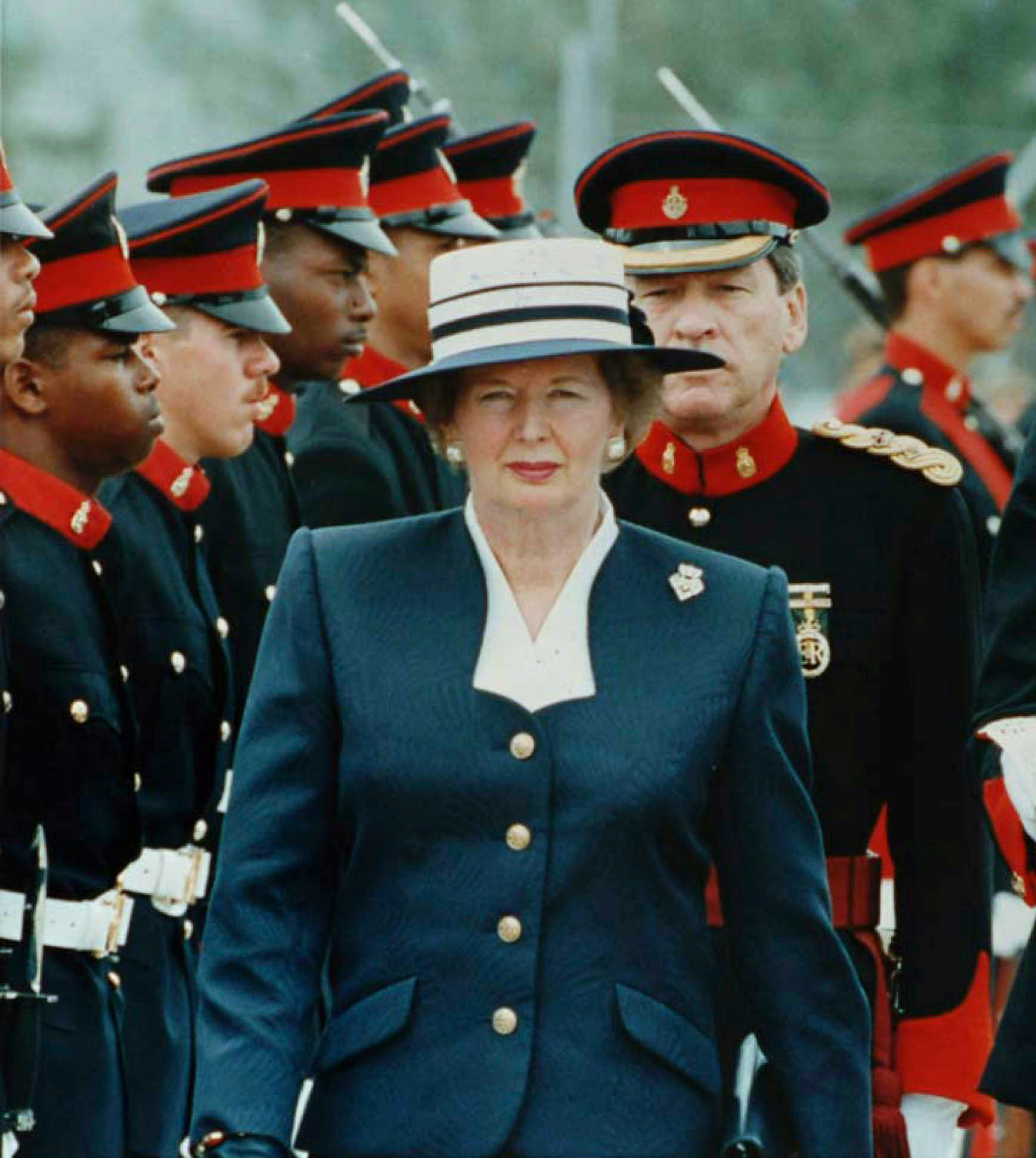It’s a matter of substance as much as form, writes Michael Brenner. And it helps explain the self-imposed lobotomy of the U.S. foreign policy establishment in recent years.

“You Tough Guy, You.” (Irwin Scott, Flickr, CC BY 2.0)
 Americans admire “tough guys.” This is nothing new. It is part of the national creed.
Americans admire “tough guys.” This is nothing new. It is part of the national creed.
Men to match our mountains, pioneers, frontiersmen, trailblazers, injun fighters. Think of our popular culture heroes today: Clint Eastwood’s deadly show-down in The Good, The Bad, The Ugly or The Sniper, or Rocky, or Trump on the stump. All fictional – so what.
 In the sexist past, we sniggered at Clark Gable telling Vivien Leigh: “Frankly, my dear, I don’t give a damn.” Then there is the mythic Ernest Hemingway — who epitomized in letters and life the distinctive American image of self-conscious masculinity — the hard-drinking, straight-talking man of action. (I don’t know how many literary critics have noted that one reason for Hemingway’s appeal to generation after generation is that his male characters can be easily related to by young men who are weak on emotional maturity and character development.)
In the sexist past, we sniggered at Clark Gable telling Vivien Leigh: “Frankly, my dear, I don’t give a damn.” Then there is the mythic Ernest Hemingway — who epitomized in letters and life the distinctive American image of self-conscious masculinity — the hard-drinking, straight-talking man of action. (I don’t know how many literary critics have noted that one reason for Hemingway’s appeal to generation after generation is that his male characters can be easily related to by young men who are weak on emotional maturity and character development.)
Even former President Donald Trump — the buffoon and ultimate phony — evokes admiration among more men than ever will admit it.
It’s hard to think of episodes or persons enjoying comparable fame that feature moral integrity, altruism, or compassion. Abraham Lincoln is the one notable exception.
In the world of politics — as well as business — the adjectives that convey ability are: hard-driving, go-getter, ambitious, tough-minded, no-nonsense, pro-active, can-do guy. Physical characteristics to match are: lean, whipcord, craggy, rough-hewn, gimlet-eyed. Implicit in these characterizations is the notion that the person in question is also “whip-smart” or has “a steel-trap mind” – even if rusted shut for decades.

Donald Trump campaigning in 2016. (oriana.italy, Flickr)
“Wise” or “sage” never appear. “Thoughtful” is for suspect pointed-headed intellectuals. The popular word for them is “egghead,” e.g. Adlai Stevenson. “Egg-head” has become an arcane expression — for the simple reason that thoughtful, erudite people are nowhere to be found on the American political scene nowadays.
Never in living memory has a designated appointee to any senior post been described by the media or commentators as “a striver,” “your basic B- mind,” “a plodder” or “Peter Principle personified.”
Please Support CN’s Fall Fund Drive!
Case in point: the nonpareil incompetent L. Paul Bremer III (who paraded around the Green Zone in a Brooks Bros suit and scorpion-resistant desert boots) was proclaimed a savvy, hard-headed and seasoned veteran of Kissinger Assoc. Even today, after his fiasco of a performance, he is called upon by the networks to offer deep insight into Middle Eastern affairs. Once “whip-smart,” always “whip-smart.”

Members of the Iraqi media interview Ambassador L. Paul Bremer, left, on Dec. 13, 2003, at the Sheraton Hotel in Bahrain. (U.S. National Archives)
In a similar vein, the top brass of the Pentagon prowl the inner corridors of power decked out in desert camouflage gear in a supposed gesture of solidarity with the GIs gritting it out in America’s far-flung wars. This get-up is better at concealing middle-age paunches than at revealing the exact purpose of their dusty missions.
The point is to project “tough” — nothing more, nothing less. Blind perpetuation of our fruitless wars itself is like the generals wearing of combat fatigues in the sense that one aims at projecting a hard-ball image of America to the world, the other to a domestic audience.
The Ethos, Summed Up
The ethos neatly is summed up by Vince Lombardi’s dictum: “When the going gets tough, the tough get going” – matched by “winning is not the most important thing, it’s the only thing.”
Toughness has its accompanying language. Tough guys swear. Profanity is de rigueur. (“De rigueur” being the kind of wimpy phrase to be avoided, of course. John Wayne or Clint Eastwood never did anything de rigueur) Washington especially is crucible for cussin’ tough guys with grit. If you don’t curse, you’re a weakling – or worse.
We don’t associate the Obama administration with vulgarity of this kind; and, indeed, former President Brack Obama himself always was well-mannered in speech as well as conduct. His associates are another story.

Rahm Emanuel in 2012, as mayor of Chicago. (U.S. Army, Flickr, CC BY-NC-SA 2.0)
Rahm Emanuel, Leon Panetta and Tim Geithner were world-class profanity artists. They were addicted to the standard Anglo-Saxon 4-letter words. With subordinates, with counterparts, with anyone who challenged them. Rahm in particular was notorious for dressing down “progressives” who might venture into his office to suggest — however mildly — that coddling Wall Street crooks or wavering on repeal of the Bush tax cuts for the rich was neither sound policy nor winning politics. The objects of his abuse put up with this — as the wimps and losers they were. One pitcher of ice water dumped on Rahm’s head could have gone far to prevent the electoral disasters befalling the “hard-nosed” Democrats. Nice guys needn’t finish last if they occasionally get angry with cause.
What does this mean for women in positions of power or reaching for power? Some expected “the fair sex” to have a mollifying influence on the tough-guy/hard-ball ways that long ruled the corridors of power. They’ve been proven wrong — not only in terms of ruthless ambition but in style, too.
Gender Equality

Margaret Thatcher reviewing the Royal Bermuda Regiment in early 1990. (White House, Wikimedia Commons)
Cursing has been accepted as a mark of gender equality. Initially, it was a calculated display to advertise the fact that she was “one of the guys;” now, it has become standardized as the norm — if not quite de rigueur. That women in power would behave no differently from men should have come as no surprise — at least for anyone who had lived life a generation or two back outside the cinema or rarified academic seminar rooms.
After all, we had the examples of Golda Meier, Indira Gandhi, Margaret Thatcher, Winnie Mandela and their sorority sisters in Bangladesh, Sri Lanka and Pakistan. Not to speak of the last Madame Mao and legions of Lady Macbeths who have been the steely will behind the stiletto. In the U.S., only a few innocents imagined Hillary Clinton ushering in an age of kindness and gentility — whatever they thought of her politics.
She tells how the USA destroyed Libya.
Hillary Clinton: Yes, We came. We saw. He died (Muammer Gaddafi)
Look at this. Oh my Gosh. This woman must be a war machine. pic.twitter.com/TpOt4BuOQy
— Ekin Evans (@DavidDavud4) June 5, 2021
The “tough guy” syndrome is a matter of substance as much as form. That is a salient yet neglected aspect of public life — especially insofar as it affects the making and conduct of foreign policy. It goes a way toward explaining the lobotomy that the foreign policy establishment has performed on itself in recent years.
Yet, it has been ignored by analysts and commentators. That is due, in part, to the tough-guy/hard-ball syndrome being taken for granted. It is an attitude reinforced by the entrenched aversion to frank truth telling that governs our political culture. I know of only one serious effort to make the connections between American tough-guy mythology and the nation’s foreign policy orientation. Can Governments Learn? was published several years again by Lloyd Etheridge who was a professor of political science at MIT. It received scant attention at the time — or since. The book schematizes various dimensions of the “tough/hard-ball” syndrome — leaving to the reader the task of making applications to present conduct
Playing Hard Ball

June 3, 2010: General Stanely McChrystal, right, receives a briefing while visiting troops in Badghis Province, Afghanistan. (Gurugu, CC BY-SA 4.0, Wikimedia Commons)
For those unfamiliar with American colloquial parlance, “hard-ball” refers to the game of baseball with is played with a tightly-woven, very hard ball. It stands in contrast to “soft-ball,” essentially the same game played with a somewhat larger, less dense ball. “Playing hardball” implies a readiness to throw “brush-back” pitches to intimate the batter, what they call in cricket “a beamer.”
The “hard-ball” syndrome was vividly described in the account of General Stanley McChrystal and his team’s notorious romp through Paris and Berlin by Michael Hastings in Rolling Stone which led to McChrystal’s. firing. It is depicted in the film War Machine with Brad Pitt improbably cast as the austere, gaunt McChrystal. He was hailed as “the warrior monk,’ the modern-day Templar boldly defying the Saracen onslaught.
Less prominent in these hagiographic accounts was his role in Iraq where he commanded the notorious Camp Nama where thousands of Iraqis were jailed and a “black site” torture facility operated. The conditions at Nama spawned the Islamic State and nurtured its leadership.
McChrystal’s next assignment was Bagram in Afghanistan where he introduced a more modest version of his Nama set-up. After getting sacked for insubordination by making insulting remarks about the wimpish president and vice-president, the general nonetheless received lavish praise and ardent backing from Obama’s Secretary of Defense Robert Gates. He subsequently was honored with an appointment by Yale University as a senior fellow who taught a heavily subscribed graduate seminar entitled “Leadership.”
The elite Ivy League school thereby set itself a precedent. Yale recently has eagerly accepted very big donations from two hard-right billionaires to fund a Brady-Johnson Program in Grand Strategy to train a select corps of future foreign policy-makers who would be np-nonsense realpolitikers.
The lure of the lucre was irresistible. Insisting on the privilege to dictate who and what will be allowed in the classroom, they have forced the program’s director to resign for non-compliance. I guess that the program’s mission is to harden the graduates’ noses in preparation for their taking commanding positions in the Washington security establishment — with Yale’s benediction.
Yale President Peter Salowey brushed it all off with a few trite words. The vapid message does stand as yet another example of the shameless contempt our public leaders have for their constituents — and ultimately for themselves. This is a different aspect of the “tough-guy” syndrome: one customized for power-holders in high-brow organizations who are quietly proud to play “hard-ball” while preserving their “butter-won’t-melt-in-my-mouth” façade.
Michael Brenner is a professor of international affairs at the University of Pittsburgh. mbren@pitt.edu
The views expressed are solely those of the author and may or may not reflect those of Consortium News.
Please Support Our
Fall Fund Drive!


My recurring bitter fantasy: Interviewer to Sec. State Madeline Albright: “Worth it to who?”
Obama the alleged well mannered Nobel Peace Laureate in 2016 alone dropped 26,171 bombs. That’s 3 bombs every hour, 24 hours a day. On his way out the door in Jan. 8, 2017, Obama dropped a final bomb on tiny Yemen.
We can think of Angela Merkel, a successful and compassionate leader who took in refugees living on th roadside. The apocalypse of Islamic mayhem hasn’t happened.
Jacinda Adern reacted to the Christchurch massacre with decision and also conveyed genuine human empathy to the relatives. Her statement, whether they have come recently or been here for generations, these people are us” set a standard rarely seen.
She also took resolute action over covid with no more warning than Trump had. Yet compare the differences, a few handfuls of deaths per million as against over 2,000 per million.
The whole attitude of Americans is always “we are correct, you are wrong, we will attack you”. Diplomacy is considered weakness, and the point of view of our “adversaries” is unimportant. Men or women, our representatives on the world stage have to be tough guys. Think of Samantha Power, Victoria Nuland, Jeane Kirkpatrick, Madeleine Albright, Susan Rice as well as their male counterparts.
Madeline Albright’s comment on the thousands of sick and children who died as a result of the sanctions on Iraq, “a price worth paying”.
I understand the seemingly total dislike for the “Queen of Chaos” but she gets far too much credit here for being a rotten human being.
If memory serves me correct, when questioned in 1996 about the excessive deaths in Iraq due to sanctions if “the deaths of a half a million children were worth it”, Madeleine Albright stated that “We think the price was worth it “, and that is not all she said on the topic. In another statement from her wiki in 1998 she stated “But if we to use force it’s because we are America; an indispensable nation.”
The way I see it she doubled down on earlier hateful rhetoric. I can not say for sure who taught who what but these are no grandmotherly types, either of them.
Her wiki says PolitiFact says she was against the 2003 war on Iraq. PolitiFact was not a “thing” until 2007 and seemed to be a big Trump supporter, if true she was schizophrenic as Trump.
Thanks CN
It is a little surprising that such a question was even asked at all.
1. It’s hard to think of episodes or persons enjoying comparable fame that feature moral integrity, altruism, or compassion. Abraham Lincoln is the one notable exception.
Jimmy Carter?
2. I would suggest this US Wolf Warrior tough guy foreign policy explains Havana Syndrome. Spouting endless imperial tough guy US foreign policy that you know is arrogant Exceptionalist BS must surely take a toll on ones physical health if you are a normal human being.
President Carter has a lot of blood on his hands. His peaceable reputation is undeserved.
“If ever there were a man who displayed on his face the evil in his mind, it was Zbigniew Brzezinski, the national security advisor for President Jimmy Carter when the US plot to start the war against the Soviet Union on the Afghan front was hatched in 1979. “Now we can lure the Russians into the Afghan trap,” he wrote Carter in a secret note of February 1979. In July of that year he followed with the directive Carter signed in secret to supply arms to the mujahideen “to induce a Soviet military intervention”. In December 1979 Brzezinski told Carter: “we should not be too sanguine about Afghanistan becoming a Soviet Vietnam”. Later he used to boast that had been precisely his intention and also his crowning achievement.
Brzezinski’s lips are sealed now because he’s been dead for four years. Carter is still alive. In 1979 he kept the evil on his mind secret behind the smile on his face. His lips are sealed now, since the retreat from Afghanistan began by the US Army, and after the rout last month in Kabul. The mainstream American press are not reporting they have asked Carter for comment, or that he has refused. Not even the alt-media investigators have pursued him.”
hXXps://www.nakedcapitalism.com/2021/09/the-two-satans-of-afghanistan-and-jimmy-carters-lips-are-sealed.html
Macho? Norman Mailer’s 1967 ‘Why Are We in Vietnam?’.
” She tells how the USA destroyed Libya.”
Yes, but the reaction of the ‘interviewer’ is also very disturbing. She joins in instead of taking her to task for joking about the brutal killing of Gaddafi and the devastation of Libya.
To be fair to the interviewer it is human nature for people to defer to the powerful people. It is a survival instinct. You don’t only see this in humans, but in other animals, for example dogs as well.
If that is the case, then why bother interviewing these people, if you’re always going to be deferential and not challenge them, when it’s the job of journalists to challenge the powerful? The answer of course is that these are not actually journalists, they’re courtiers.
I know as well as you do that they do it to keep their very well paid jobs and access to “power”, but real journalists don’t suck up to war criminals.